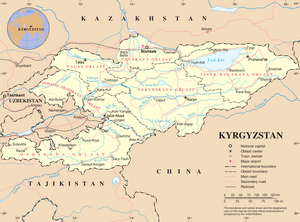Global Fund for Women reports that an LGBT group in Kyrgyzstan have achieved a breakthrough on transgender rights which still eludes many Western nations.
Kyrgyzstan is a landlocked and mountainous, formerly Soviet state in Central Asia. In the last year it has suffered major ethnic rioting and a change of government. It hosts the only US military base remaining in Central Asia.
Kyrgyzstan has passed new gender marker legislation which does not require a formal document to be issued by a medical institution showing a medical intervention. The new law solves the problem of there being no such process for medical professionals to follow and no relevant government document necessary.
The law is the result of years of work by Labrys, a group working for LGBT rights in Kyrgyzstan which has existed since 2004.
The law was signed, without objections, by 13 various Ministries of the Kyrgyz Republic. The decree is now on the Prime Minister’s desk awaiting the final signature.
After authoring alternative reports for UN human rights bodies on violence and discrimination facing Kyrgyzstan’s LGBT population, Labrys garnered international attention, which they used to establish an official working group with the Kyrgyz Republic’s Ministry of Health.
The first of its kind, the working group is made up of health officials, medical specialists, psychiatrists, Labrys representatives, and people from the transgender community. Their goal is to develop an identity policy that upholds the rights and dignity of transgender people.
Labrys staff conducts trainings for doctors and psychiatrists on sexual orientation and gender identity. The group is now a trusted resource for Kyrgyz medical specialists.
Homosexuality is legal but individuals still risk losing their jobs and becoming disowned by their families. Despite the progress, the rate of violence is still staggering: Labrys' research shows that one in four LBT interviewees experienced sexual violence and were forced into “curative” sexual situations.
In 2008, Human Rights Watch (HRW) called on officials to “halt anti-gay raids,” highlighting an assault on the main office of Labrys. Police searched the premises and read private files without a warrant, interrupting a dinner party with international funders. During an earlier raid on Labrys, police threatened “they would rape everyone inside,” according to HRW.
As LGBT representatives have grown more organized and capable of defending themselves against strong-arm tactics, law enforcement officials have turned to threatening and extorting money from community members.
The group has become a leader amongst Russian speaking nations, most recently helping a fellow group in neighbouring Tajikistan submit a report to the United Nations. They train activists in other Central Asian countries on how to document human rights violations.












 Join our page
Join our page

